Chapter 3: Get To Know Your SERPs
SERPs? It stands for “search engine results pages.”
Simple enough. Got that out of the way.
If you’re a musician, especially one who cares about your SEO, then SERPs matter a lot to you. We’re going to focus on Google in this eBook because that’s where most people go when they search.
So let’s get into why SERPs matter to you.

When most people think SEO, they’re thinking about getting good rankings for keywords. But the neat thing about SEO for musicians is that there’s much more to it than that.
When your fans search for you in Google, they can do more than just find you. They can explore your music and content right in search engine results pages, before they even reach your band website or social profiles.
This is thanks to Google’s Knowledge Graph and the cool things they do with it specifically for musicians and fans. We’ll explain that and show you real-life examples in this chapter.
So doing good music SEO means getting to know what your fans are going to experience in SERPs when they search for you, because it’s a direct reflection of your band.
Let’s drill that point in: SEO for musicians is about optimizing your online fan experience, when they’re searching for your music and content.

In fact, you could consider your band keyword SERPs to be another online profile you need to maintain, just like your band website or Facebook page. But unlike your other online profiles, fans will visit your band keyword SERPs when they search for you, whether or not you pay any attention to it.
So let’s take a look at some of these band name SERPs, which have different possible components that can change depending on the search term.
Your Band Name SERP
The SERP for your band name is going to be the most important one to you. This is because your band name is probably the keyword people will use most often when searching for you.
As an example, let’s see what Google gives us when we search for Zardonic.
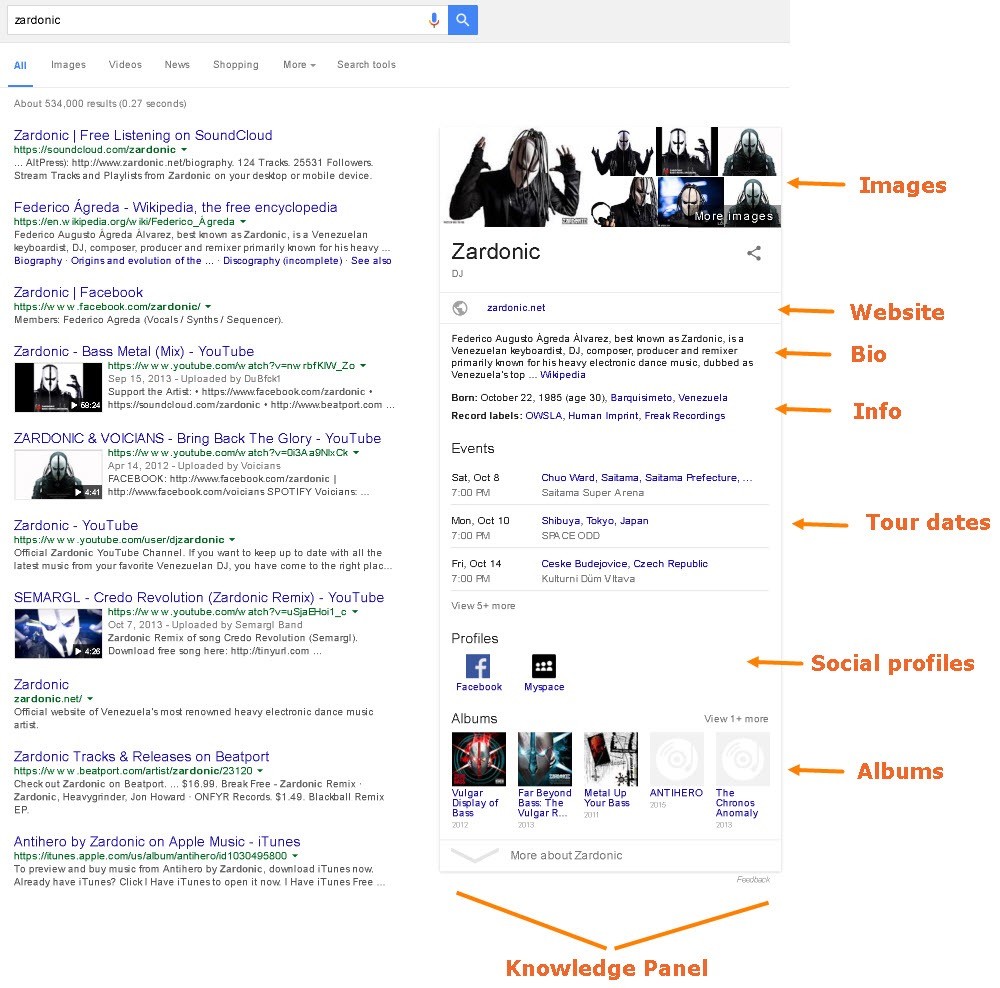
This is a pretty typical-looking SERP when you search the name of an established band.
So we’ve got:
- Zardonic’s band website.
- YouTube, Facebook, SoundCloud, Beatport and iTunes profiles.
- A Wikipedia entry.
- Video results embedded in the SERP.
- A Knowledge Panel which has:
- Images that link to Google Image searches
- Artist information that links to Wikipedia
- A link to Zardonic’s “official” website
- Other Wiki-style information like hometown, genre, band members, etc.
- Album list, that links to SERPs for those album names
- A list of tour dates, that link to SERPs for those events
- Social profile icons that link to those profile pages
Other things you sometimes see, that you don’t see in the example above, are:
- Twitter feed
- A list of songs in the Knowledge Panel
- Interviews, reviews and news (usually for higher profile artists)
- Tour dates (i.e. Bandsintown profile page)
- Various other kinds of artist profile pages (depending on what you have)
- Google Image results
So, right away here there is a ton of interesting content and information for a fan to look through during the Exploration stage of the Fan Journey. These are all things we can optimize for.
This is really the ideal scenario for you and your fans, as far as your band name SERP goes.
Before they click on any results, fans can already see what you look like, the names of your albums, your upcoming tour dates, and other bits of information.
The thing that really sticks out on this page, of course, is the Knowledge Panel. This is information that’s displayed from Google’s Knowledge Graph.
Google decides for itself what to put there, based on the information it has available from around the internet. But you can influence what’s there by doing - you guessed it - good SEO.
We’ll explain in detail later how you can optimize your Knowledge Panel.
For now you might want to start by just Googling your band name to see what your SERP looks like, and compare it to other established artists to get a better sense of what’s possible.
Your Tour Date SERPs
Google can offer a really nice experience for your fans in the SERPs for your tour dates. There are a couple of ways they can reach these SERPs.
If there’s a list of tour dates in the band Knowledge Panel on your band name SERP, like in the image below, fans can click on it and land on a tour date SERP.
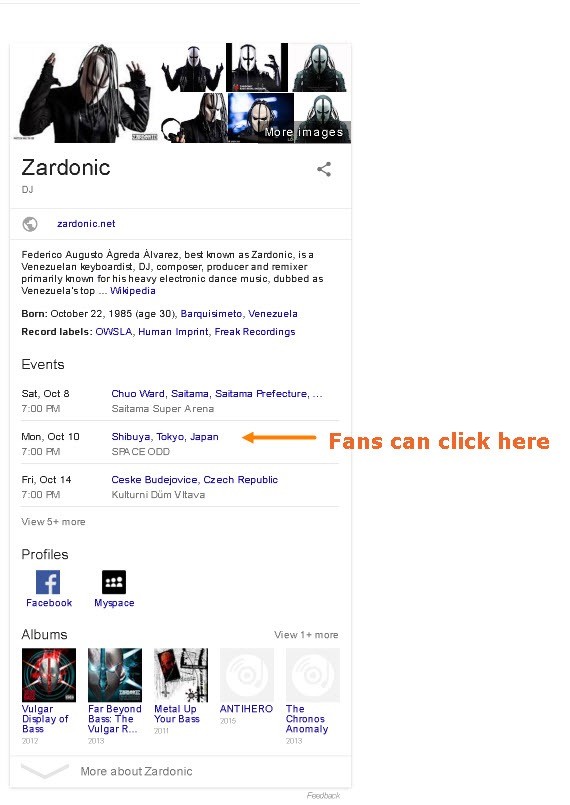
Fans can sometimes reach your tour date SERPS from your band Knowledge Panel.
They could also reach it by just typing in a search term like “zardonic tour dates”.
Let’s take a look at a tour date SERP.
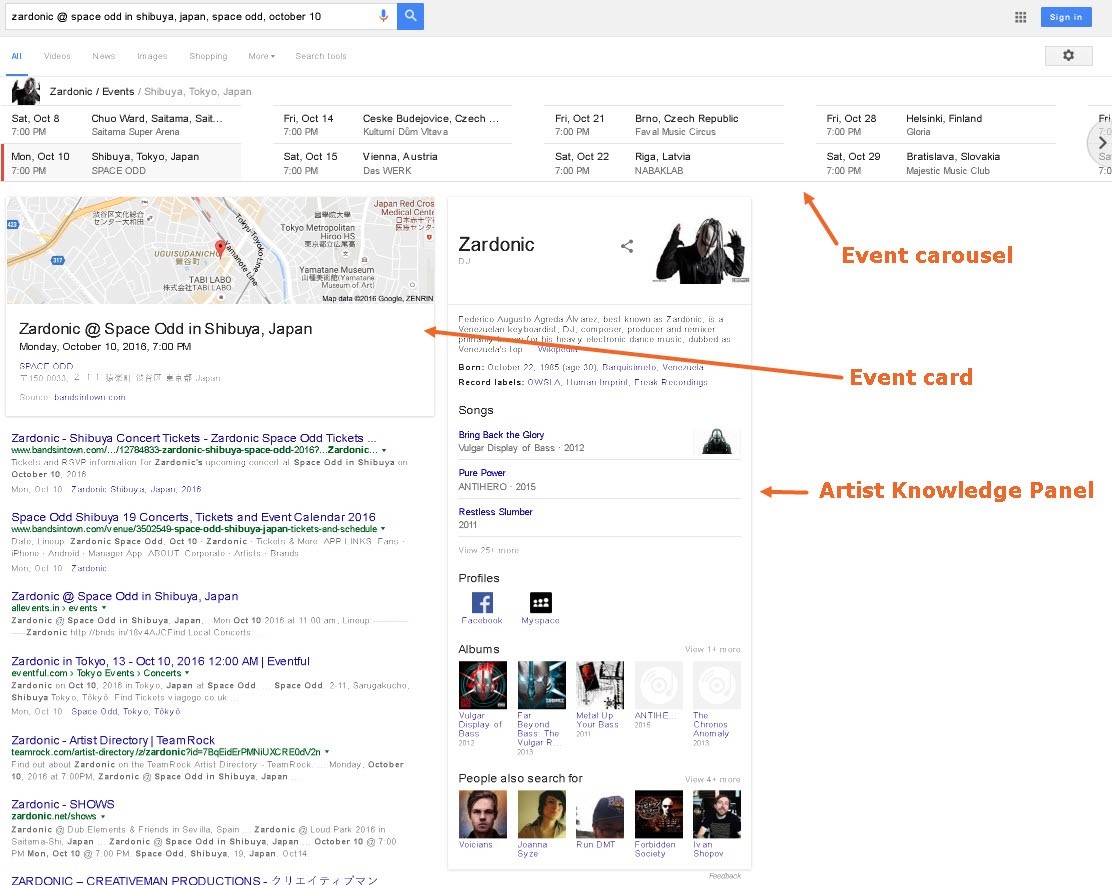
A great example of a tour date SERP.
So this is really awesome. We’ve got:
- A scrolling event carousel that shows all tour dates. Each one links to another tour date SERP.
- If the search is for a specific event, you get an Event Card that has:
- Event date and time
- Venue address with map
- Link to your band website
 There may also be a link to a 3rd party ticket vendor depending on the event
There may also be a link to a 3rd party ticket vendor depending on the event
 The same Knowledge Panel that appears on your band name SERP.
The same Knowledge Panel that appears on your band name SERP.
 The “Shows” page from Zardonic’s official website.
The “Shows” page from Zardonic’s official website.
 Bandsintown, Allevents and Eventful event information pages.
Bandsintown, Allevents and Eventful event information pages.
Some other things you might see for other events, depending on the circumstances of the show, are:
 Paid Google ads, which may appear for major shows when ticket sellers are willing to compete to pay for traffic
Paid Google ads, which may appear for major shows when ticket sellers are willing to compete to pay for traffic
 Results for ticket resellers
Results for ticket resellers
 Results from the venue website
Results from the venue website
 Opening act artist website
Opening act artist website
For a fan who wants to go to a show, there’s tons of great information here to explore before they even carry on to another website.

The point is, Google has gone to the trouble of making it possible for bands to create a rich fan experience on these pages, but it’s up to you to take advantage of it by feeding Google with the right information.
Bandzoogle, by the way, makes this really easy for you when you use our Events feature, because we automatically add structured data to your website when you add events. Bandzoogle is the only website builder that is recognized by Google for event markup. We’ll talk more about that later.
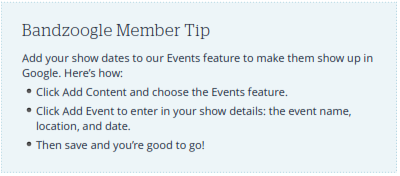
If you have some tour dates coming up, take some time to Google your event names and dates to see how easy it is for fans to find your show information and tickets in the SERPs. Compare what you find to the tour date SERPs of established artists, to see what’s possible.
Your Album Name SERPs
Google can provide a rich experience for your fans in SERPs when they search for your album names.
If you’ve discovered, from doing your keyword research, that your fans are already searching for your album names, this is going to be particularly useful to you. But even if they don’t, you can still optimize this assuming you have at least one album released.

There are a couple of ways fans can come across your album name SERPs.
If your albums are listed in the Knowledge Panel for your band, fans can click on them and land on your album SERP.
They could also get to the album SERP by just searching for something to do with your albums. Like this, for the keyword “mudhoney albums”.
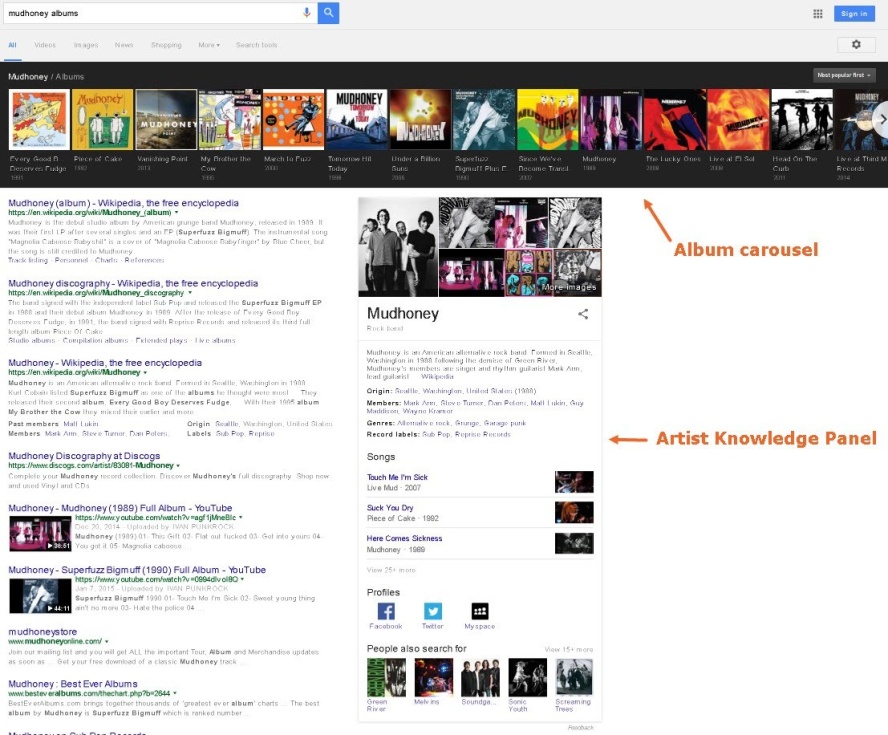
A typical SERP when you search for a band’s discography.
In this case we searched for Mudhoney’s














